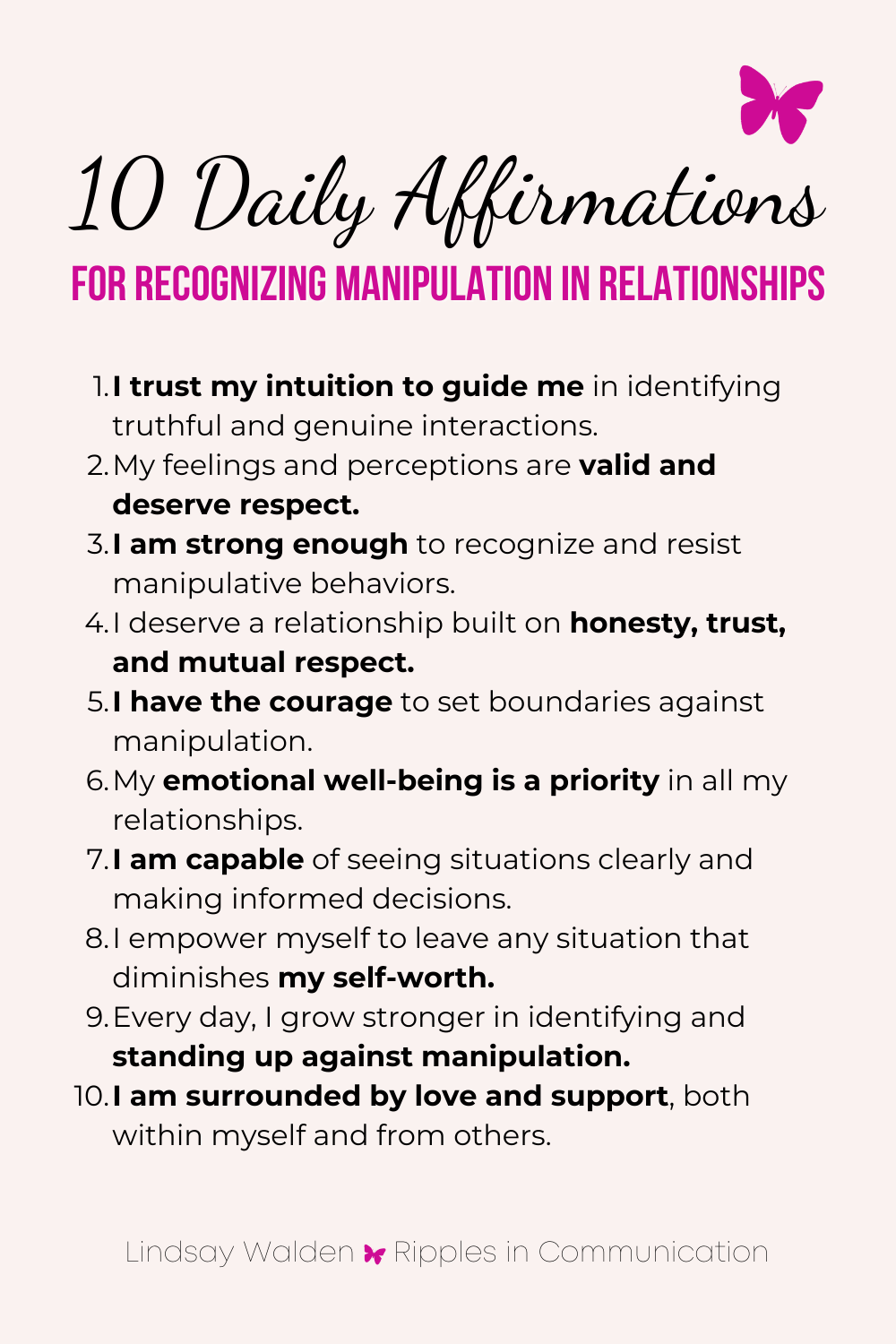How to Spot Gaslighting in Relationships
Navigating the complexities of a relationship can be challenging, especially when doubts start to cloud your perception. Are you questioning whether your partner is playing mind games? It's an unsettling thought, and the fact that this question is on your mind already indicates some level of unease. Through this blog post, I aim to offer you a perspective that's both grounding and enlightening, to help you understand and assess your relationship dynamics more clearly.
What is Gaslighting vs Manipulation?
Understanding the distinction between gaslighting and manipulation is key to maintaining healthy dynamics in your relationships. While both behaviors are harmful and can undermine trust and intimacy, they manifest in different ways and have varying impacts on your self-confidence and the overall health of your relationship.
What is Gaslighting?
Gaslighting is a specific form of manipulation where a person is made to doubt their own reality, memory, or perceptions. It is a deliberate tactic to gain power and control in a relationship. This method of psychological manipulation can leave you questioning your sanity and doubting your own experiences.
5 Signs of Gaslighting
Constant Doubt: You might find yourself questioning your recollection of events or conversations.
Feeling Insecure: Experiencing increased anxiety and a decline in self-confidence.
Frequent Apologies: Finding yourself apologizing often, even when the fault is unclear.
Isolation Tactics: The manipulator may try to cut you off from your support network.
Denial of Facts: Your partner denies what they've said or done, despite evidence to the contrary.
What is Manipulation?
Unlike gaslighting, which is focused on altering your perception of reality, manipulation in relationships can take many forms. It involves influencing someone with deceptive, abusive, or underhanded tactics to gain control or achieve a self-serving goal.
5 Signs of Manipulative Behaviors
Emotional Blackmail: Leveraging your emotions to get what they want.
Consistent Criticism: Gradually eroding your self-esteem through relentless criticism.
Passive Aggressive Actions: Avoiding direct communication and using indirect resistance.
Love Bombing and Withdrawal: Overwhelming affection followed by coldness to gain control.
Blame Shifting: You're always blamed, and they never accept responsibility.
Impact on Confidence and Relationship
Both gaslighting and manipulation can severely impact your mental well-being, leading to constant self-doubt and reduced self-esteem. These behaviors create an unhealthy power imbalance in the relationship, eroding trust, respect, and open communication.
Breaking the Cycle
Recognizing these behaviors is the first step towards reclaiming your confidence and restoring balance in your relationship. Educate yourself about these tactics, seek support, set firm boundaries, keep a journal of your experiences, and trust your instincts. You deserve a relationship based on mutual respect, trust, and honesty. Identifying and addressing manipulative behaviors is crucial in ensuring your relationship is healthy and fulfilling.
Discover the subtle signs of mind games in your relationship. Learn how to identify and address these challenges
Understanding Your Feelings: Is It New or Ongoing?
Moving into your current situation, it's essential to pinpoint when these feelings began. Ask yourself, have you always felt this way in your relationship, or is this a newly developed unease? If it's a recent development, your gut feeling might be signaling a real change in your partner's behavior. Trusting your intuition is important, but so is a rational evaluation of the situation.
If your partner's behavior has been consistent throughout the relationship, it might simply be their personality. However, consistency doesn’t automatically equate to acceptability. It’s crucial to determine whether their behavior, though consistent, is healthy and respectful towards you.
Journaling: A Tool for Clarity
I often recommend journaling to my clients. While it doesn't have to be a daily ritual, maintaining a record of your feelings and experiences can be enlightening, especially when you suspect mind games. This practice isn't about binding yourself to a schedule but about gaining insights into your relationship.
As you journal, look for patterns. Do specific incidents or feelings recur on certain days or situations? Identifying these patterns can provide clarity on what’s truly happening in your relationship.
Specifically, look for these two indicators:
1. Listening vs. Dismissiveness
A key indicator of manipulative behavior, such as gaslighting, is how your partner responds to your expressions. Are they genuinely listening, or do they dismiss your feelings and thoughts? If you find your confidence waning during interactions with them, it could be a sign of manipulation.
2. The Effect on Your Confidence
Notice if your self-assurance fluctuates based on your interactions. If you feel less confident or more confused after speaking with them, this could be a red flag. Manipulative individuals often use confusion as a tool to gain control.
Explore the power of balancing intuition and rational thinking in your relationship.
Seeking Healthy Relationship Dynamics
While it's essential to be vigilant, constantly searching for problems can lead to a negative perception of your relationship. The goal isn't to find faults for the sake of it but to ensure a healthy, fulfilling relationship where both partners feel secure and respected.
Consider this scenario as a litmus test: if your partner told you something implausible, like the sky is an unusual color, would you instinctively doubt them? Your reaction to this hypothetical situation can reveal a lot about your trust and comfort levels in the relationship.
Final Thoughts and Ongoing Support
Remember, it's okay to seek clarity in your relationship. If you're feeling unsettled or uncertain, these feelings warrant attention. However, it's equally important to approach this exploration with a balance of intuition and rationality.
In a healthy relationship, trust is foundational. You should feel confident in your partner's words and actions. If there’s a consistent discrepancy between what they say and what you feel or observe, it's a sign that your relationship dynamic needs attention.
Open, honest communication is key. Consider discussing your feelings with your partner. Sometimes, what appears to be mind games could be a result of miscommunication or misunderstanding. However, approach such conversations with care, ensuring that you express your feelings without accusation, and be open to listening to their perspective as well.
If these issues persist or you find it challenging to navigate them, don’t hesitate to seek professional help. As a couples and sex therapist, I can provide a safe space for both of you to explore these concerns. Therapy can be a powerful tool in understanding and improving your relationship dynamics.
Empowering Yourself
Remember, you are a powerful and important individual. Trusting your instincts, seeking clarity, and striving for a healthy relationship are all signs of strength. Whether you choose to journal, communicate directly, or seek professional help, each step you take is a move towards a more fulfilling relationship.
If you have more specific concerns or need further elaboration, feel free to reach out. I'm always open to discussing these topics in more depth, and I'm here to support you every step of the way.
Your journey to a healthier, more fulfilling relationship starts with understanding, and I'm here to help you navigate that path.
Empower yourself daily with these 10 affirmations designed to strengthen your ability to recognize and resist manipulation in relationships. Embrace your inner strength, trust your intuition, and maintain your emotional well-being with these powerful daily reminders.







